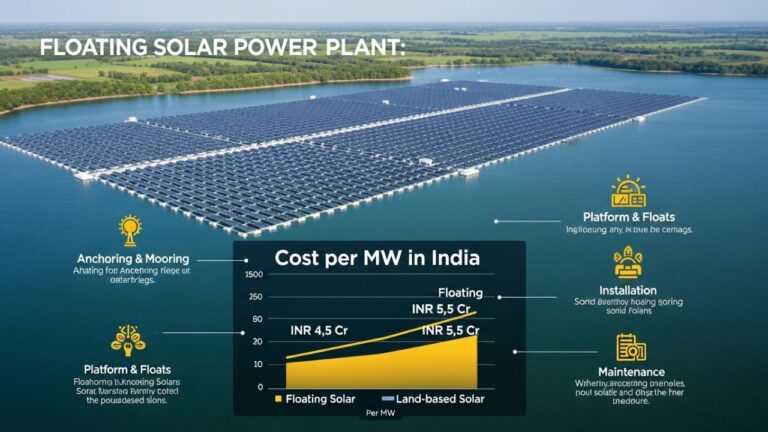Solar panel insurance has become one of the most crucial topics for homeowners, commercial entities, and solar developers in India in 2025. With the country’s rapidly expanding solar capacity and increasing investments in renewable energy, insurance coverage for solar systems is now more relevant than ever. This article explores what solar panel insurance in India covers, what it excludes, and how it safeguards one of the fastest-growing green investments in the country.
Introduction: Why Solar Panel Insurance Matters in 2025
In 2025, India has solidified its position as one of the global leaders in solar power adoption. With government programs such as PM-Surya Ghar: Muft Bijli Yojana, the rooftop solar market has exploded, reaching millions of urban and rural households. As costs decline and technology improves, solar systems represent a long-term asset—but also come with risks. Natural disasters, electrical faults, and even theft can lead to heavy losses for system owners.
Solar panel insurance serves as a financial safety net. It ensures protection against unforeseen damages to panels, inverters, and other components due to perils such as fire, lightning, storms, vandalism, or accidents. Beyond safeguarding physical assets, insurance also helps businesses and homeowners maintain consistent energy production and financial stability.
Understanding Solar Panel Insurance in India
Solar panel insurance in India typically combines features of property and engineering insurance. The coverage can be integrated into general home, commercial, or specialized renewable energy insurance policies.
Types of Solar Panel Insurance
- Standalone Solar Plant Insurance:
Comprehensive protection specifically designed for industrial and utility-scale solar farms. - Solar Add-on Under Home Insurance:
For residential users, many insurers like Policybazaar and HDFC Ergo offer solar panel coverage as an optional extension under home protection plans. - Manufacturer and Installer-Based Policies:
These are warranty-linked programs covering defects, workmanship issues, or installer insolvency.
Read Also: Commercial Rooftop Solar System Payback in India 2025: A Complete Guide for Businesses
What Solar Panel Insurance Covers
Solar policies in India have evolved to address region-specific risks like monsoons, cyclones, voltage fluctuations, and theft. Let’s explore what modern policies generally include.
1. Natural Disasters and Weather Events
Most comprehensive solar insurance plans cover damage caused by natural calamities, including:
- Cyclones, storms, and floods
- Lightning or fire
- Earthquakes and typhoons
- Hail and heavy rainfall
Insurers such as HDFC ERGO, ICICI Lombard, and Tata AIG provide exclusive warranty insurance that includes natural event protection spanning 5–10 years.
2. Fire and Explosion
Solar installations are susceptible to fire risks due to overheating, electrical malfunctions, or external causes. Fire and explosion coverage ensures full replacement or repair cost of the affected components.
3. Theft and Vandalism
Theft is a common concern, especially for solar panels installed on rooftops or warehouses. Solar insurance reimburses the value of stolen panels or associated equipment such as batteries, inverters, and cables.
4. Mechanical and Electrical Breakdown
Modern policies include protective cover for internal failures due to voltage surges, short circuits, or inverter faults. This is particularly beneficial for solar systems operating in areas with unstable grids.
5. Accidental Damage
Panels might get damaged during cleaning, maintenance, or physical impact (for example, falling debris). Insurance compensates for accidental physical damage to ensure minimal downtime.
6. Business Interruption Losses
Several commercial policies now include loss-of-income coverage due to energy production interruptions. This benefit is essential for corporate solar farms relying on power sale revenue.
7. Third-Party Liability
If a solar panel or related component causes injury or property damage to third parties, liability coverage helps manage potential lawsuits or claims.
What Solar Panel Insurance Does Not Cover
While insurance plans are comprehensive, they also include specific exclusions that consumers should understand clearly.
- Pre-existing Damage: Damage occurring before the insurance policy activation is not covered.
- Negligence or Improper Maintenance: Any loss resulting from poor installation, lack of scheduled maintenance, or non-compliance with regulations is excluded.
- Normal Wear and Tear: Routine degradation of panels or components over time is not part of coverage.
- Improper or Unauthorized Repairs: Damage caused by non-certified technicians or unapproved equipment voids claims.
- Cyber or Data Risks: Smart monitoring devices linked to IoT often face data threats, which are generally not covered unless added through a cyber liability extension.
- Intentional Damage or Fraudulent Claims: Any deliberate harm or misrepresentation invalidates coverage.
Major Insurers and Their Coverage in India (2025)
| Insurer Name | Policy Name | Main Coverage Offered | Duration |
| HDFC ERGO | Solar Rooftop Insurance | Fire, theft, storm, earthquake, accidental damage for rooftop systems up to 10kW | 1–5 years |
| ICICI Lombard | Photovoltaic Panel Warranty Insurance | 10–12-year panel and inverter replacement coverage | Up to 12 years |
| Tata AIG | Solar Module Warranty Insurance | Weather damage, electrical faults, and mechanical breakdowns | 10 years |
| New India Assurance | Solar Energy Insurance Policy | Protects manufacturers and buyers under contract terms | Variable |
| Reliance General | Photovoltaic Module Warranty Policy | Manufacturer-backed guarantee for module defects | Variable |
| IFFCO-Tokio | Photovoltaic Sales Warranty Policy | Supports buyer protection during warranty claims | Variable |
| Chola MS | Chola Solar Plant Protect Policy | Comprehensive coverage for industrial/commercial plants | 5–10 years |
Regulatory Backing: MNRE and BIS Standards
The Ministry of New and Renewable Energy (MNRE) and the Bureau of Indian Standards (BIS) play critical roles in standardizing solar quality and safety regulations in 2025.
- Under the 2025 Quality Control Order, solar PV modules and inverters must meet strict BIS certification marks, enhancing bankability and reducing insurance claim disputes.
- Non-compliance with BIS standards can result in claim denials or penalties, emphasizing the importance of certified installation and maintenance practices.
- MNRE’s advisory also maintains an updated list of approved insurers to ensure transparency and reliability in the solar insurance ecosystem.
Cost of Solar Insurance in India in 2025
The cost of solar insurance in India varies based on system capacity, location, coverage type, and the insurer. Typical estimates include:
- Residential Systems (Up to 10 kW): ₹2,500 – ₹4,000 annually
- Commercial/Industrial Plants (10 kW to 1 MW): ₹0.25 – ₹0.50 per watt annually
- Utility-Scale Projects (Above 1 MW): Custom negotiated based on project value, often part of consortium insurance under EPC contracts
Example:
A 5-kW rooftop solar system in Chennai might cost around ₹3,000 annually for a plan covering fire, theft, and natural calamities—equivalent to about ₹250 per month for full protection.
Government Policies and Incentives Reinforcing Solar Safety
The government’s 2025 renewable energy policies encourage consumers to protect solar investments through affordable insurance options.
Key developments include:
- Mandatory Safety Regulations:
Updated quality control norms ensure that only compliant modules qualify for state subsidies and insurance eligibility. - Insurance Booster Schemes:
Public-sector insurers partner with solar developers to expand low-premium coverage options for small-scale users. - PM-Surya Ghar Yojana:
Under this flagship program, several homes receive one-year complimentary solar insurance from providers like Tata AIG via Tata Power Solar.
These frameworks enhance consumer protection and investor trust, reinforcing India’s global reputation as a safe solar market.
Why Solar Insurance is Essential for Businesses
Commercial solar developers, EPC firms, and independent power producers face significant financial risks due to project scale and exposure. Insurance ensures:
- Bankability for Financiers: Insured projects attract easier financing due to reduced risk.
- Protection from Downtime: Quick claim processes restore generation capacity faster.
- Long-Term Asset Value: Extends lifespan and resale value of equipment.
- Regulatory Compliance: Meets legal requirements of lenders and DISCOMs.
Common Claim Process for Solar Panel Insurance
- Notify the Insurer: Report the damage or loss within 24–48 hours.
- Provide Documentation: Submit invoices, installation proofs, system photographs, and claim forms.
- Site Inspection: Insurer sends an authorized surveyor to evaluate the damage.
- Verification and Settlement: Upon verification, claim amounts are disbursed within 7–10 business days, depending on policy terms.
Real-World Example: Rooftop Solar Insurance in Chennai
Mr. Natarajan, a Chennai resident with a 6-kW rooftop solar installation, chose HDFC ERGO’s 5-year solar insurance for ₹4,499. During the 2024 monsoon, storm winds dislodged 2 panels, resulting in ₹18,000 damage. His claim was processed in 10 days, with full reimbursement—illustrating the value of early insurance adoption.
Read Also: The Status of Large-Scale Solar Projects in the UK 2025: Growth, Challenges & Future Outlook
Key Benefits of Solar Panel Insurance in India
- Protection from natural and accidental damage
- Financial security and faster recovery from system downtime
- Compliance with safety and lender requirements
- Enhanced peace of mind for solar investors
- Increased long-term asset reliability and resale potential
Conclusion
As solar adoption accelerates in India, insuring these renewable assets is no longer optional—it’s essential. In 2025, solar panel insurance acts as both a safety blanket and an enabler of sustainable growth. Whether for a household in Pune or a 50 MW solar park in Rajasthan, insurance ensures that energy independence doesn’t come at the cost of financial vulnerability.
With government-backed regulations, competitive insurance offerings, and innovative coverage options, India is not only becoming a solar superpower but also a model for secure, bankable clean energy investments.
FAQs
Q1. Is solar panel insurance mandatory in India?
No, it’s not legally required, but it is strongly recommended, especially for commercial and financed projects.
Q2. What is the average annual premium for residential rooftop solar insurance?
Between ₹2,500 and ₹4,000 per year for systems up to 10 kW capacity.
Q3. Can I insure existing panels already installed at my home?
Yes, most insurers cover existing solar systems after inspection and document verification.
Q4. Does insurance cover power generation losses?
Yes, select commercial policies offer business interruption coverage for downtime losses.
Q5. Which are the best insurers for solar panel insurance in India?
Top players include HDFC ERGO, ICICI Lombard, Tata AIG, New India Assurance, and Reliance General.




